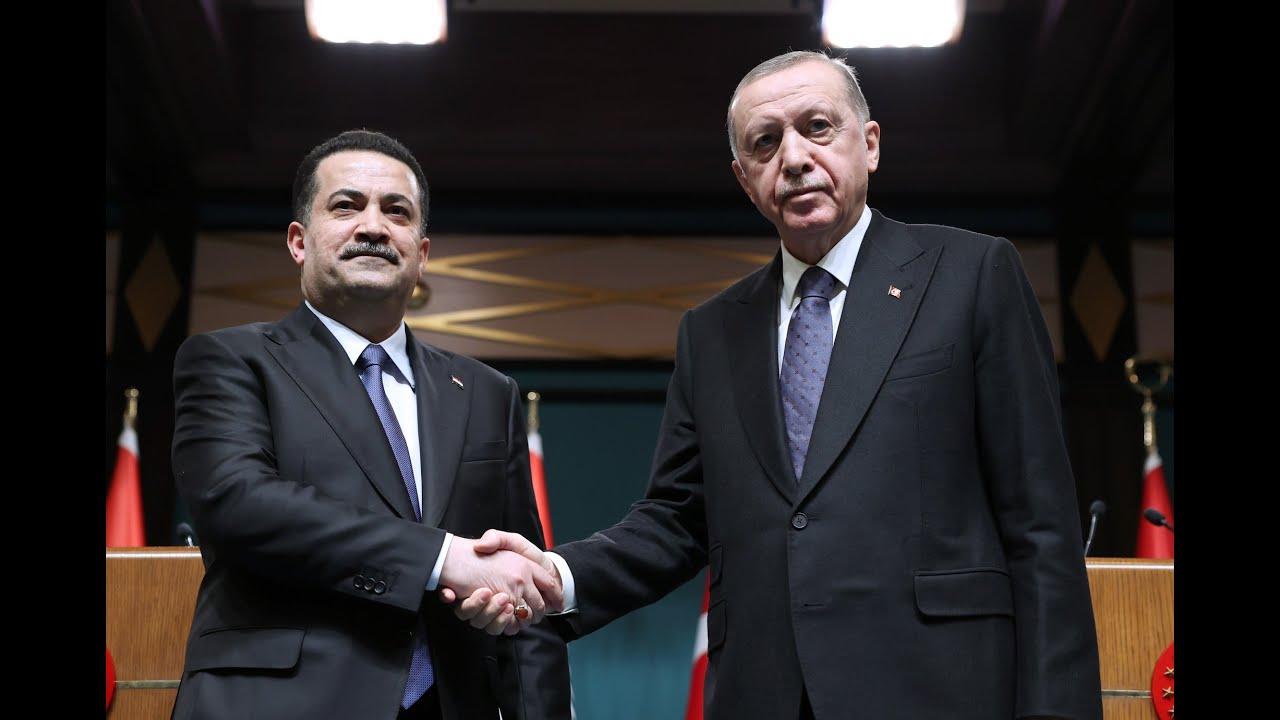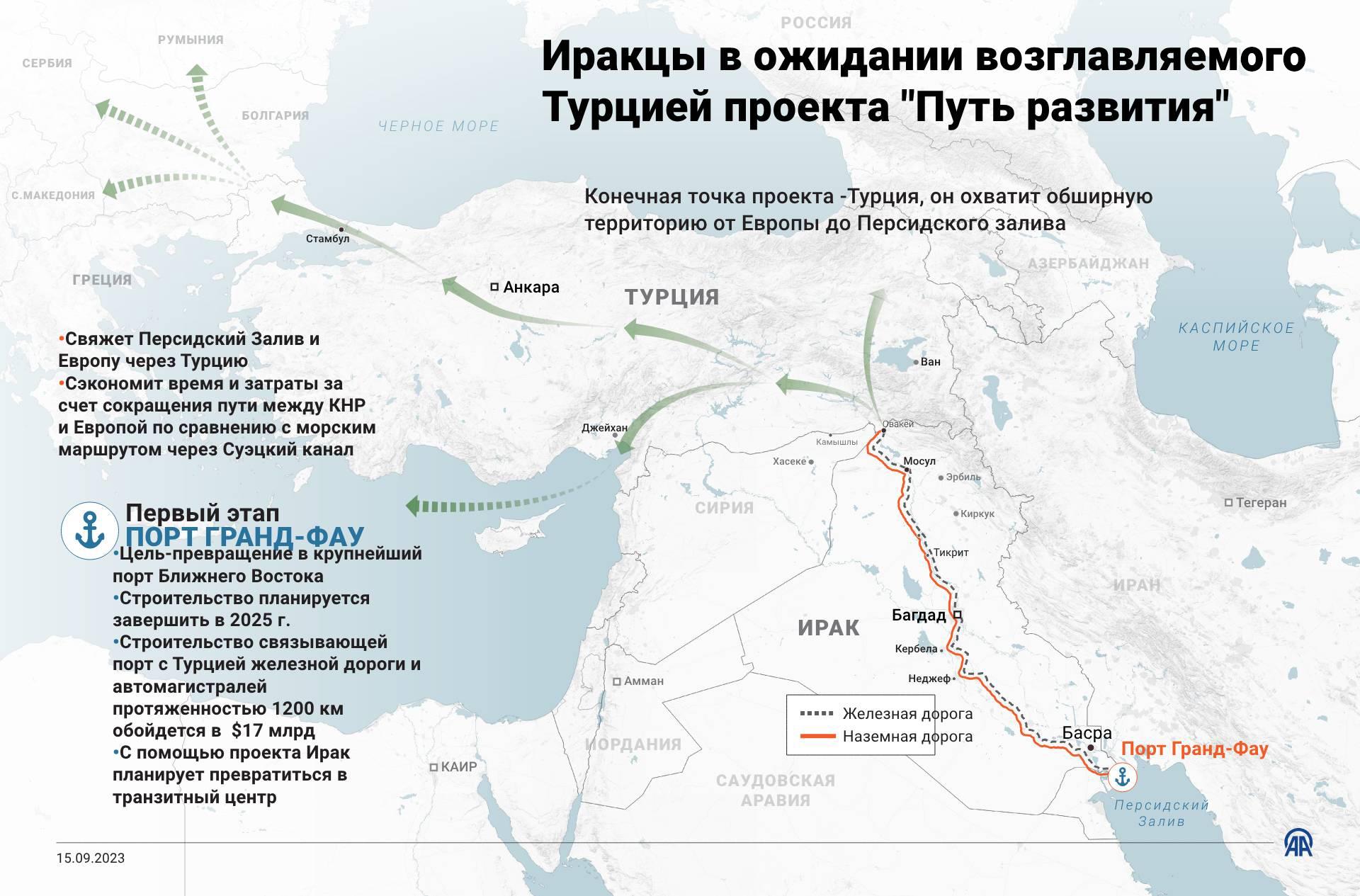Turkish-Iraqi relations forge new paths with “Road to Development” initiative Shaping Middle East landscape
Turkish President Recep Tayyip Erdogan arrived in Baghdad on April 22 for his first official visit in 12 years. His objective was to sign agreements with the Iraqi leadership, marking a breakthrough in relations between the two countries and paving the way for a new strategy involving a group of states in the Middle East.
Erdogan arrived at the meeting with Iraqi Prime Minister Mohammed Shia Al-Sudani and other Iraqi leaders leading large delegation which included Foreign Minister (formerly head of Turkish intelligence) Hakan Fidan, Interior Minister Ali Yerlikaya, National Defence Minister Yaşar Güler, Trade Minister Omer Bolat and a number of other top officials. It would not be an exaggeration to say that almost the entire leadership of the Turkish state was present at the talks.
There are great number of tensions between Iraq and Türkiye, of which the three most significant can be highlighted. Firstly, the water issue. Iraq's 40 million people are critically dependent on water resources of the Tigris and Euphrates. Over 90 per cent of Iraq's drinking water supplies come from these rivers. Türkiye, which is upstream, uses them for hydropower development and irrigation, so there is a dispute between the countries over water use.
The second problem is exports to Türkiye, from Iraqi Kurdistan's oil fields. The International Chamber of Commerce in Paris imposed a $1.5 billion fine on Türkiye, "for violating a 1973 pipeline agreement to facilitate oil exports from Iraqi Kurdistan," a federal territory of Iraq led by its own government and military. Türkiye, has since stopped buying oil there.
Thirdly, there is the problem of the presence in Iraq, in the Qandil Mountains, of armed PKK (Kurdistan Workers' Party) units, an organization officially recognized as a terrorist organization in Türkiye, which is engaged in armed struggle against the Turkish government. Türkiye has conducted cross-border operations against the PKK, which has occasionally drawn protests from official Baghdad.

During the visit, some controversies were simply put aside, while on other issues the two sides began to come closer together. And this is not only because Baghdad is one of Ankara's key trading partners (trade turnover between the countries reaches $20 billion). Iraq and Türkiye have signed a total of 26 memorandums of understanding covering such areas as security, energy, water, defence, trade and transportation.
There are indications that the Turkish army will be authorized to conduct large-scale military operations against the PKK on Iraqi territory. Baghdad has officially banned the PKK from being present on its territory with weapons in their hands, and this can be understood as a green light given to Turkish special operations. Previously, the Iraqi leadership did not resist them, but occasionally made diplomatic demarches and protests. However, Türkiye's strategy is not only to conduct raids, but also to build military bases on Iraqi territory, a chain of which is penetrating deeper and deeper into the country. Türkiye is using the same strategy as in Syria, where its goal is to dislodge Kurdish formations and create a buffer zone controlled by the Turkish military along the entire border 30-40 kilometers deep into Syria.
Türkiye holds such an extremely important resource for Baghdad as water. Reducing the water flow would have disastrous consequences for the Iraqi government and population - it would mean drought, loss of crops, uprisings. But in exchange for a de facto ban on the PKK, Türkiye would, on the contrary, increase the flow of water into Iraq. However, there may be another reason why Baghdad has agreed with Ankara on this issue - some increase in the influence of the PKK in the Kurdish areas in Iraq itself.
But all of these agreements between Ankara and Baghdad would hardly have been possible if an agreement on a giant infrastructure project - the Development Road had not been reached. This Turkish-Iraqi transportation corridor plan involves the construction of an integrated network of roads and railroads over 1,000 kilometers long, running from oil-rich Basra to the Turkish border. Another important part of the project is the creation of the region's largest port, Al Faw Grand Port. It is designed to strengthen Iraq's maritime infrastructure and will be able to carry about 100 million tons of oil per year once fully operational.

Despite trends towards de-globalization and growing protectionism, international trade volumes continue to increase. Therefore, transportation corridors are critical to economic development. Equally important, the UAE and Qatar are the key sponsors of the project, intending to invest tens of billions of dollars. Both countries are key investors for Türkiye and it is important for Ankara to strengthen cooperation with them.
The Development Road project is of crucial importance in conditions when the pro-Iranian Houthi movement regularly bombards the Red Sea, blocking one of the main trade routes of the planet connecting Europe and Asia through the Suez Canal. If the new transport corridor becomes as expected, it will become the shortest route for goods traveling between the Indo-Pacific and Europe – 45 per cent faster than the route through the Cape of Good Hope, which traders are forced to use today because of the Houthis.

However, the Development Road is also of geopolitical significance for Türkiye. It is an alternative to the US-backed corridor between India, the Gulf Arab states, Israel and Europe, another grandiose project designed to link the infrastructure and economies of US allies. Ankara was not invited there, which drew Erdogan's ire and accelerated the development of an alternative project.
To conclude, we can state that there is a large-scale rapprochement between Türkiye and Iraq, which has many dimensions - from economics and geopolitics to military issues. At the same time, it is worth remembering that plans are one thing and their realization is another, especially when it comes to such an unstable region as the Middle East.
The views and opinions expressed by guest columnists in their op-eds may differ from and not necessarily reflect the views of the editorial staff.








